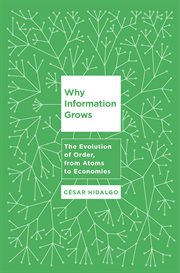Nonfiction
eBook
Details
PUBLISHED
Made available through hoopla
DESCRIPTION
1 online resource
ISBN/ISSN
LANGUAGE
NOTES
"Hidalgo has made a bold attempt to synthesize a large body of cutting-edge work into a readable, slender volume. This is the future of growth theory." -- Financial Times What is economic growth? And why, historically, has it occurred in only a few places? Previous efforts to answer these questions have focused on institutions, geography, finances, and psychology. But according to MIT's antidisciplinarian Cr Hidalgo, understanding the nature of economic growth demands transcending the social sciences and including the natural sciences of information, networks, and complexity. To understand the growth of economies, Hidalgo argues, we first need to understand the growth of order. At first glance, the universe seems hostile to order. Thermodynamics dictates that over time, order-or information-disappears. Whispers vanish in the wind just like the beauty of swirling cigarette smoke collapses into disorderly clouds. But thermodynamics also has loopholes that promote the growth of information in pockets. Although cities are all pockets where information grows, they are not all the same. For every Silicon Valley, Tokyo, and Paris, there are dozens of places with economies that accomplish little more than pulling rocks out of the ground. So, why does the US economy outstrip Brazil's, and Brazil's that of Chad? Why did the technology corridor along Boston's Route 128 languish while Silicon Valley blossomed? In each case, the key is how people, firms, and the networks they form make use of information. Seen from Hidalgo's vantage, economies become distributed computers, made of networks of people, and the problem of economic development becomes the problem of making these computers more powerful. By uncovering the mechanisms that enable the growth of information in nature and society, Why Information Grows lays bear the origins of physical order and economic growth. Situated at the nexus of information theory, physics, sociology, and economics, this book propounds a new theory of how economies can do not just more things, but more interesting things. Cesar Hidalgo leads the Macro Connections group at the MIT Media Lab and is an Adjunct Lecturer in Public Policy at the Kennedy School. A trained physicist, he also has extensive experience in the field of economic development and has pioneered research on how big data impacts economic decision-making. Finalist for the 2015 Hayek Book and Lecture Prize "The concept of information is necessary to make sense of anything that is not a boring featureless mass, including life, mind, society, and value. Why Information Grows lucidly explains the foundations of this essential concept, while creatively applying it in exciting new ways. It is filled with interesting ideas, and a pleasure to read."--Steven Pinker, Johnstone Professor of Psychology, Harvard University, and author of The Language Instinct and How the Mind Works "Mr Hidalgo succeeds brilliantly in bringing his complex subject to life. His book is full of nuggets, from memorable phrases to interesting metaphors."--Economist "Written in an accessible and entertaining style.... Hidalgo has made a bold attempt to synthesise a large body of cutting-edge work into a readable, slender volume. This is the future of growth theory and his thought-provoking book deserves to be widely read."--Financial Times "Contains some innovative thinking about what drives growth that could help us to navigate the turbulence of the ever more interconnected global economy."--Nature "Thought-provoking...Well written and accessible, the book is full of interesting ideas that deserve to be read and discussed."--CHOICE "An impassioned argument for the advantages of an information-centric view of economic growth, and for understanding the different capacities of nations to provide solutions to human problems... Hidalgo persuasively demons
Mode of access: World Wide Web







